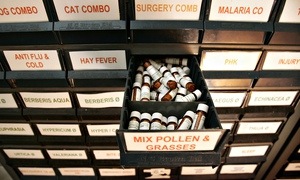
Homeopathy has been with me all my life. As a boy, I was treated by homeopaths; my first post as a junior doctor was in a homeopathic hospital, later I researched homeopathy and published more than 100 papers on the subject, and finally I summarised the entire experience in a memoir entitled A Scientist in Wonderland.
In 1993, when I became professor of complementary medicine at Exeter, I was more than happy to give homeopathy the benefit of the doubt. I would have loved to show that it is effective beyond placebo, not least because anyone doing that would almost automatically deserve a Nobel prize. He or she would have to show that a sizeable chunk of our understanding of the laws of nature is quite simply wrong. Homeopathy is based on the belief that “like cures like” and that the dilution of a medicine – homeopaths call the process “potentiation” – renders it not weaker but stronger. As both of these assumptions fly in the face of science, critical thinkers have always insisted that few things could be more implausible than homeopathy.
But plausibility is not everything. In Exeter, we conducted trials, surveys and reviews of homeopathy in the faint hope that we might discover something important. What we did find was sobering:
• Our trials failed to show that homeopathy is more than a placebo.
• Our reviews demonstrated that the most reliable of the 230 or so trials of homeopathy ever published are also not positive.
• Studies with animals confirmed the results obtained on humans.
• Surveys and case reports suggested that homeopathy can be dangerous.
• The claims made by homeopaths to cure conditions like cancer, asthma or even Ebola were bogus.
• The promotion of homeopathy is not ethical.
Now, the internationally highly respected Australian National Health and Medical Research Council have conducted what certainly is the most thorough and independent evaluation of homeopathy in its 200-year-long history. Already their preliminary report had confirmed that homeopathy is nothing other than treatment with placebos. Predictably, this caused a storm of opposition from enthusiasts of homeopathy, and they were invited to submit their evidence to the contrary. The Australians then considered this evidence carefully and have now published their final report. It arrived at the same conclusion as the previous document. If anything, it went one step further by pointing out that “people who choose homeopathy may put their health at risk if they reject or delay treatments for which there is good evidence for safety and effectiveness”. Personally, I would go another step further and remind pharmacists who sell homeopathic remedies to the unsuspecting public that it is unethical to pretend they are more than placebos.
In 2010, a House of Commons select committee assessed the evidence for and against homeopathy. It concluded that homeopathy was not more effective than a placebo and that the NHS should cease funding it. Subsequently, the government considered their report and essentially agreed with the verdict but nevertheless felt that, if patients want homeopathy, they must have it on the NHS. Such blatant disregard for the principles of evidence-based medicine infuriates scientists, perpetuates a needless debate and wastes sizable amounts of taxpayers’ money.
Undeterred by the evidence, the public continue their long and intense love affair with homeopathy. Worldwide, consumers use it in their millions and are convinced that it helps them. Few wonder whether it is the homeopathic remedy or something else, eg the placebo-effect, that did the trick. Homeopaths continue to claim that their approach is based on sound evidence; they even cite studies and reviews that seem to prove their point. Few of us wonder whether their evidence is cherry-picked and thus unreliable. In other words, the discussion about the value or otherwise of homeopathy has been never-ending, often intense and incredibly unproductive.
But, after 200 years of fruitless discussion, we finally have, in the Australian evaluation, a comprehensive, transparent and evidence-based review from a panel of experts who are competent and free of conflicts of interest as well as a government that is determined to abide by the advice thus generated. Let’s hope that others will now follow suit.
